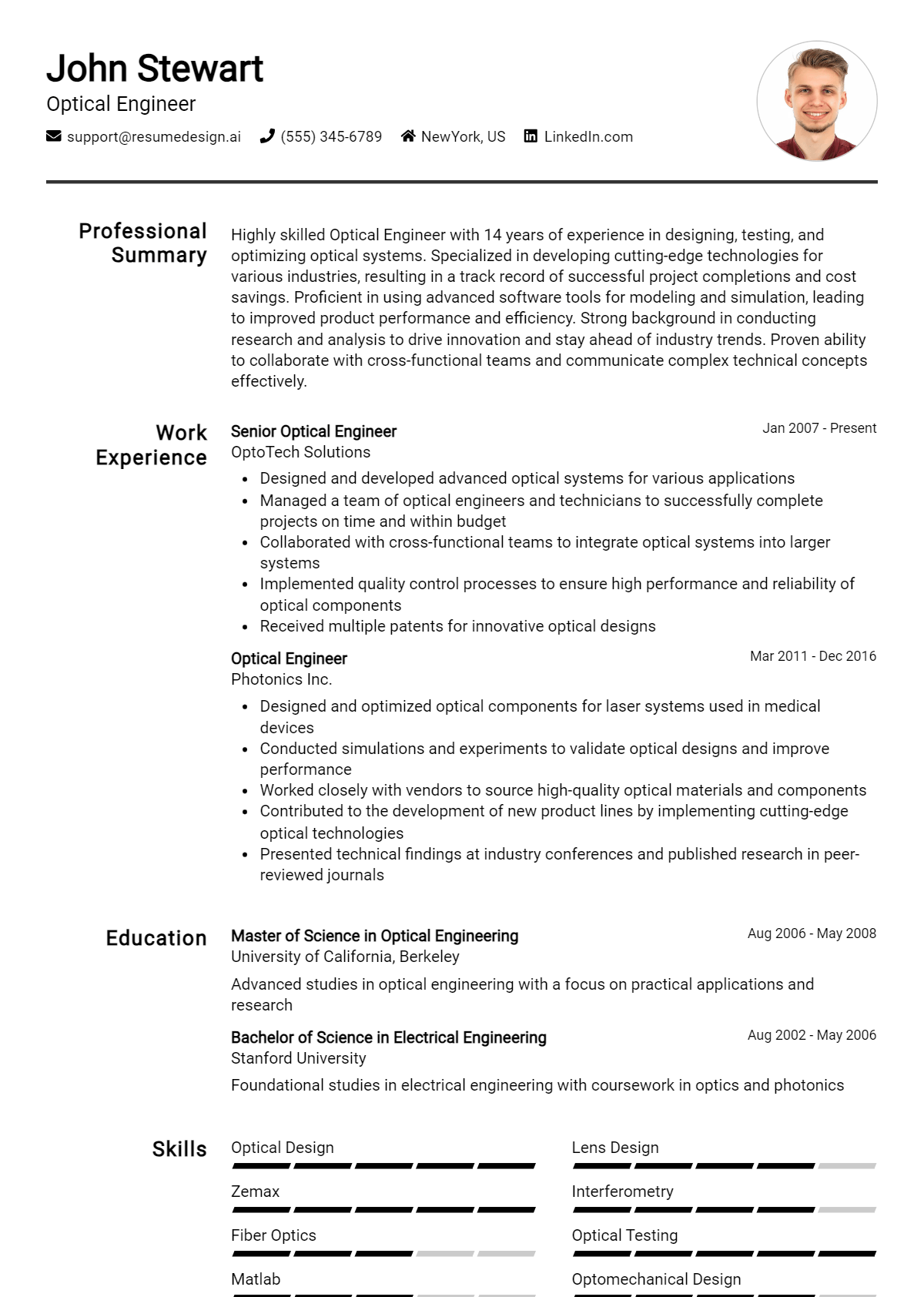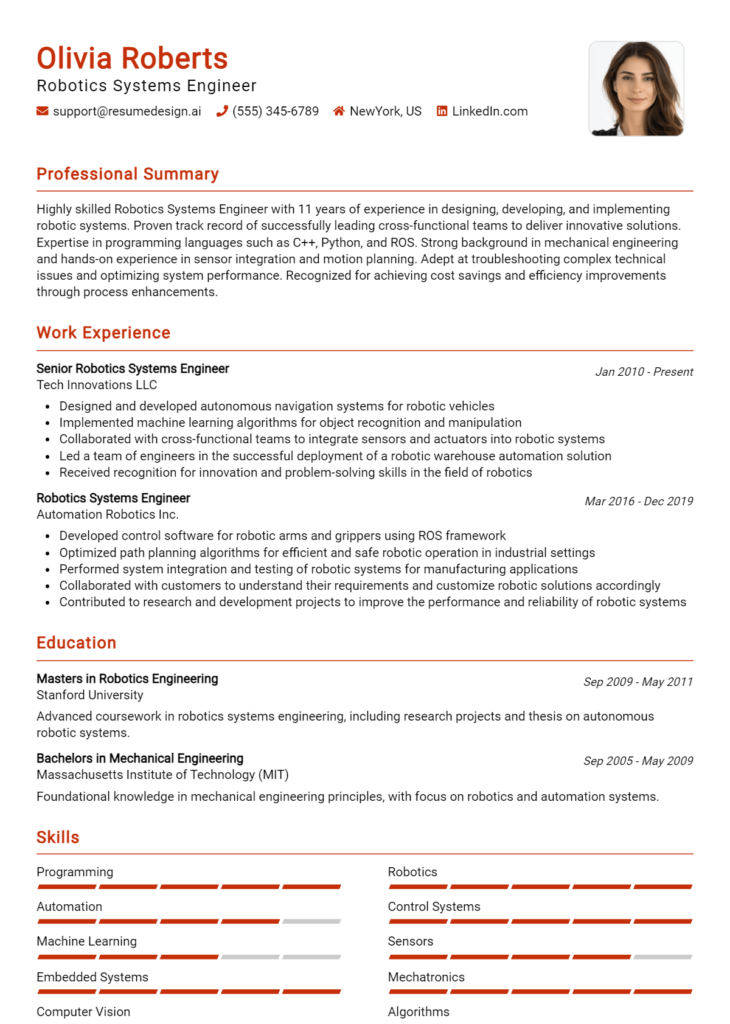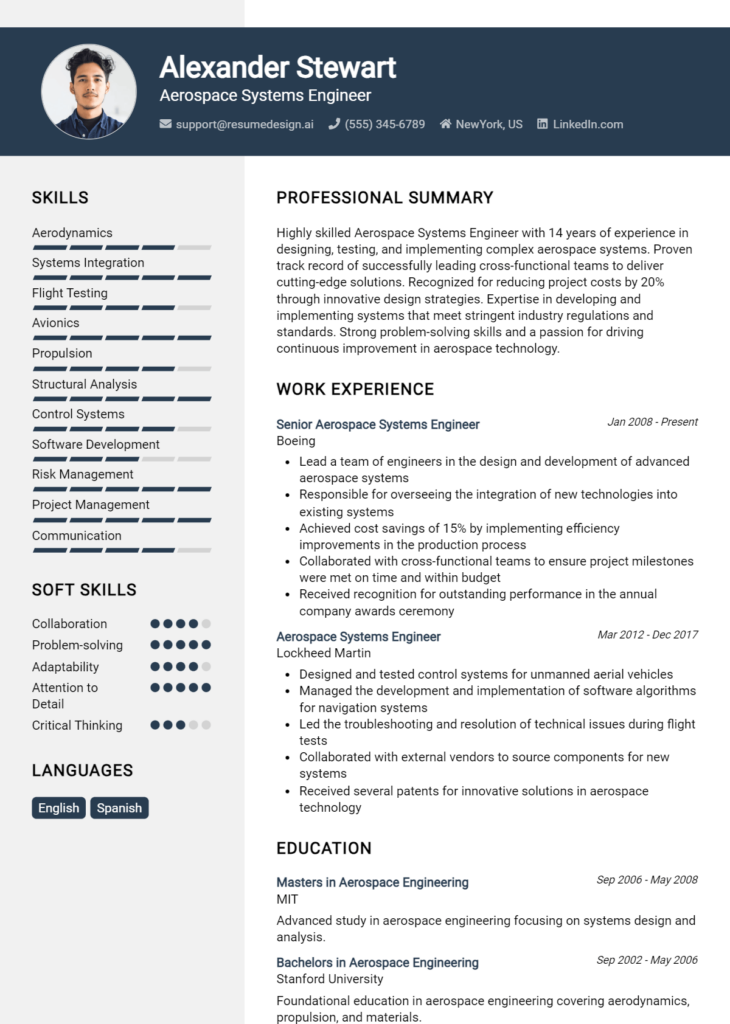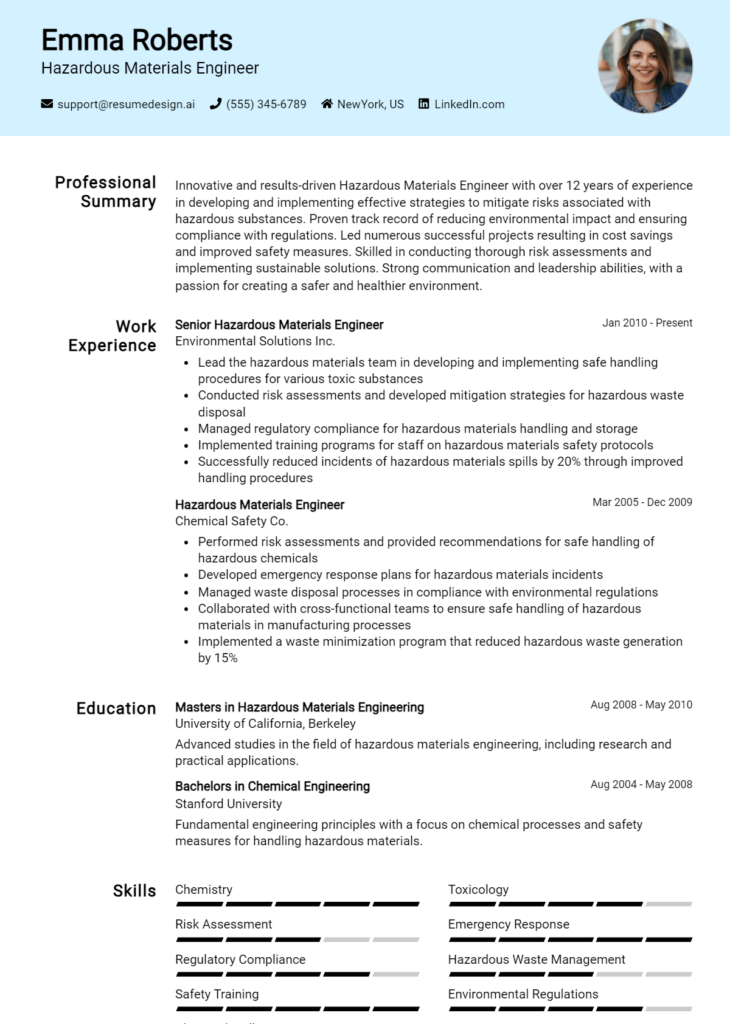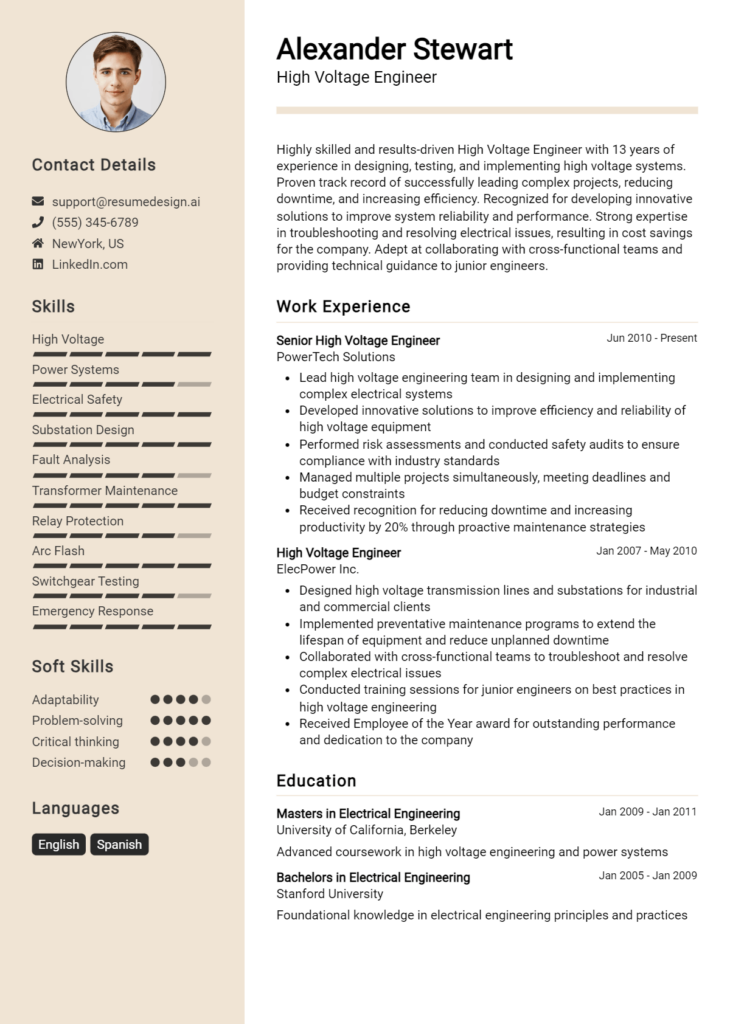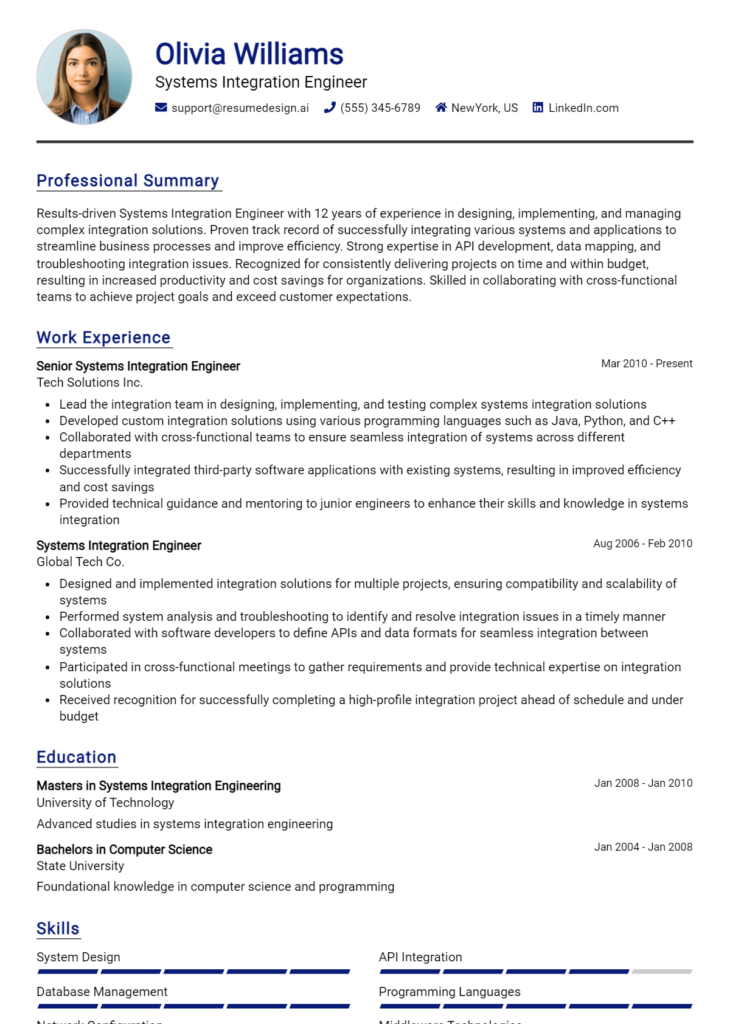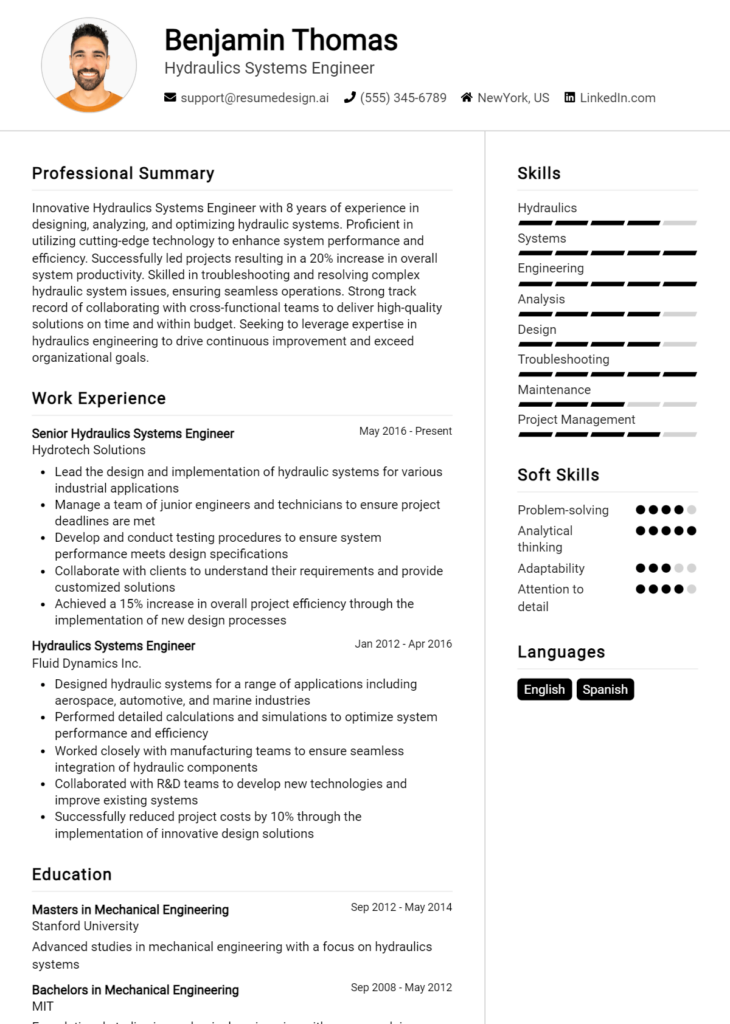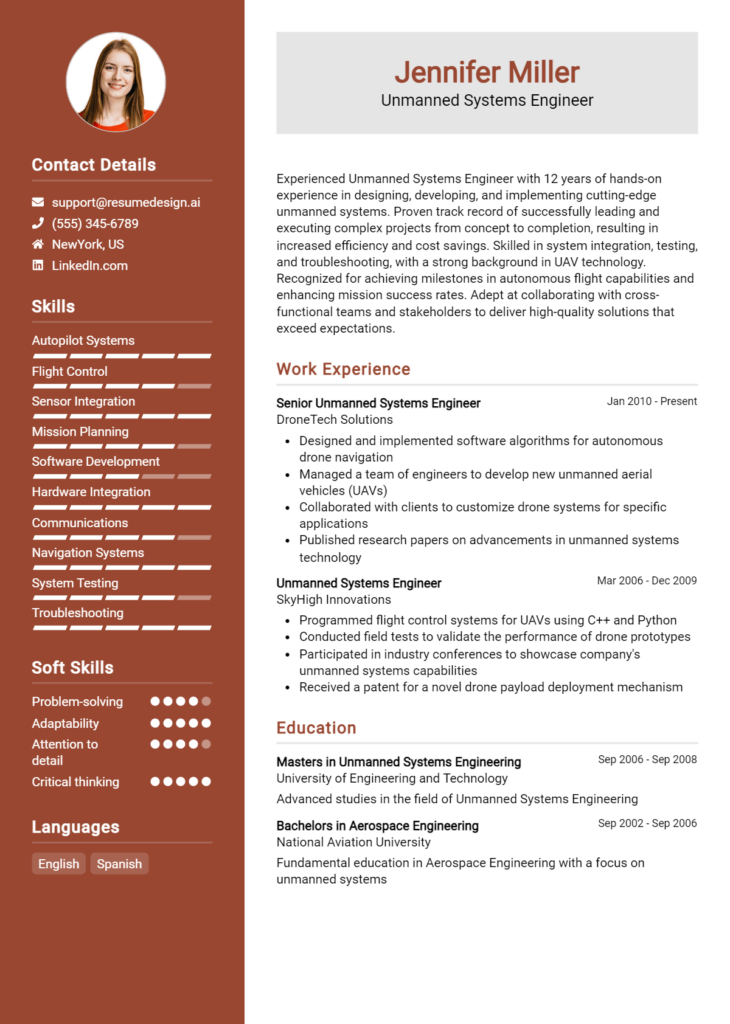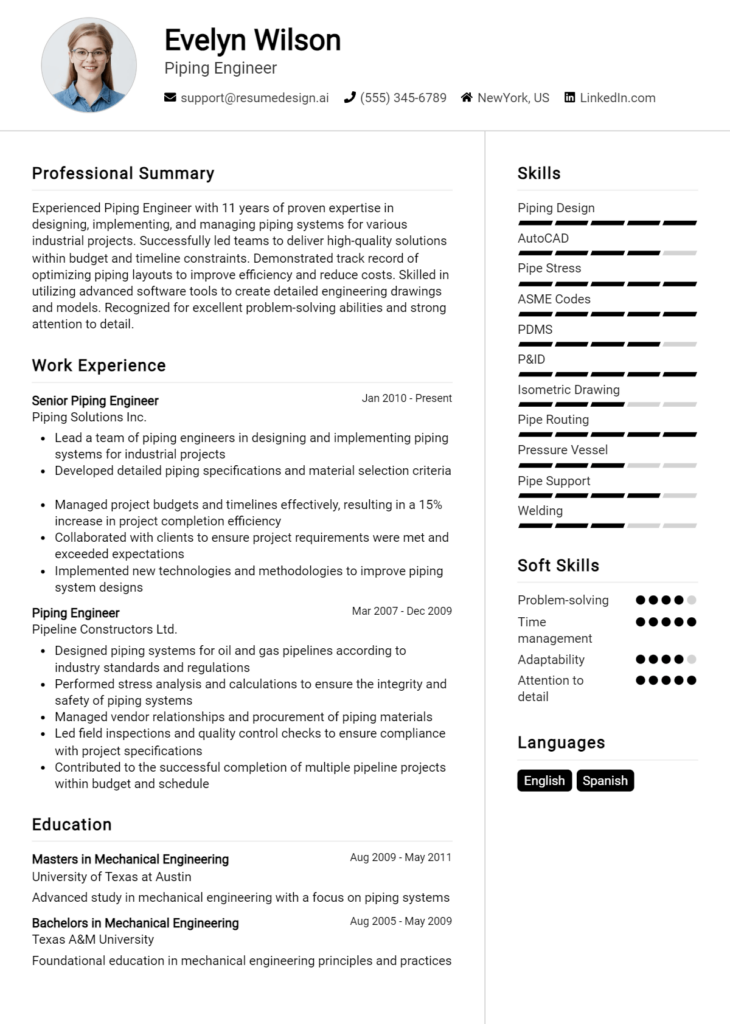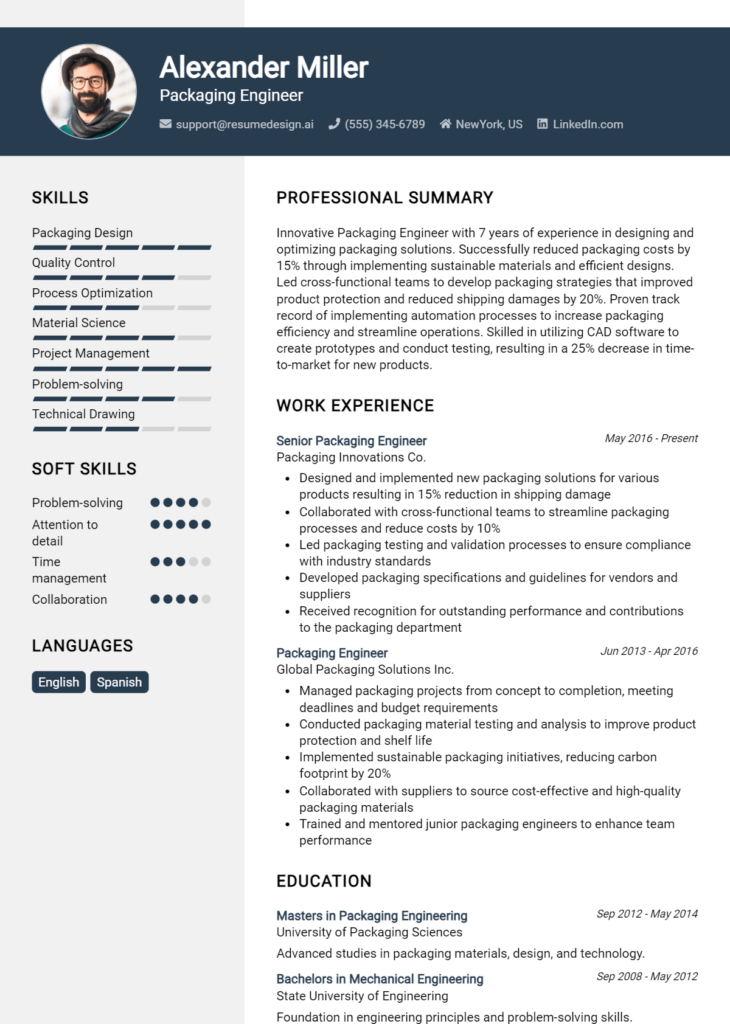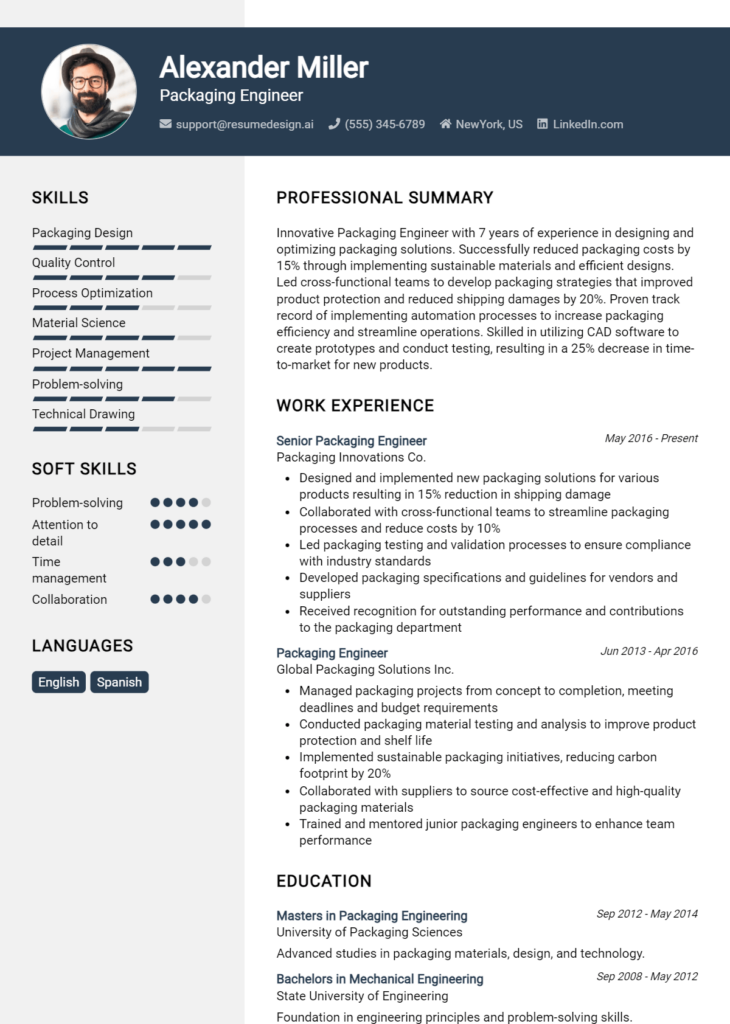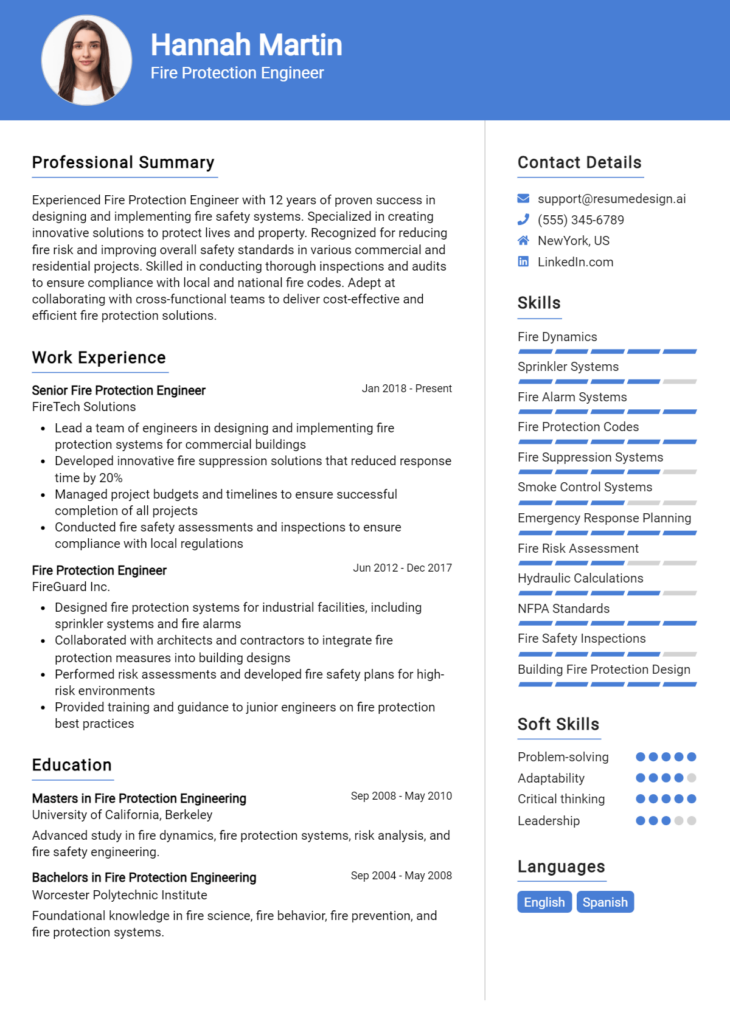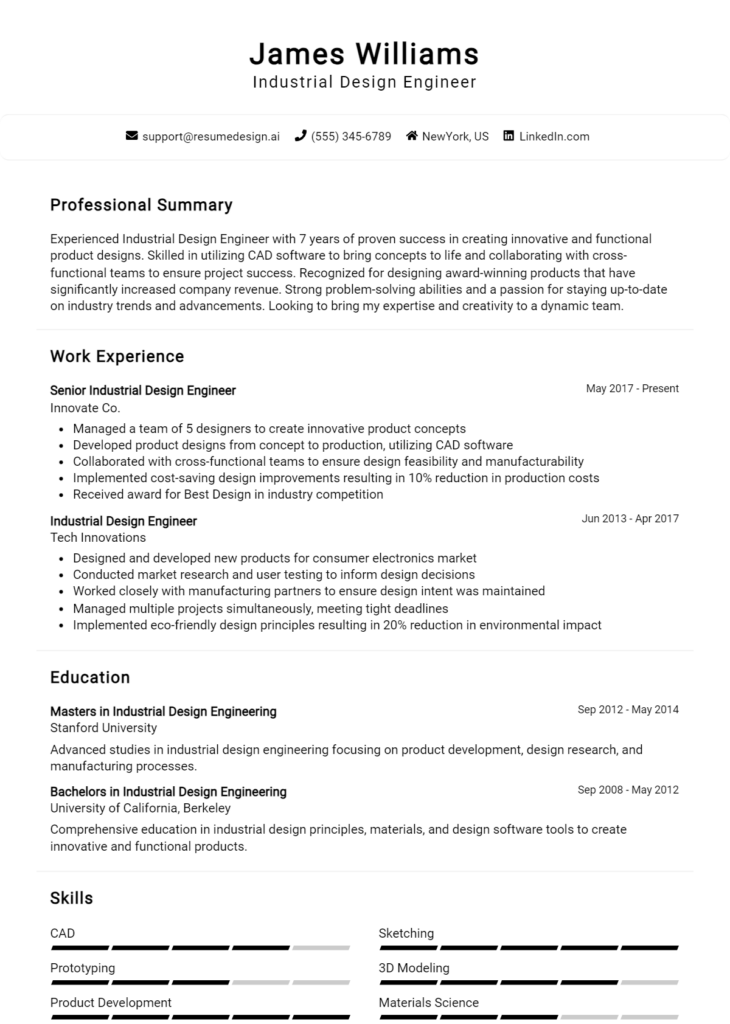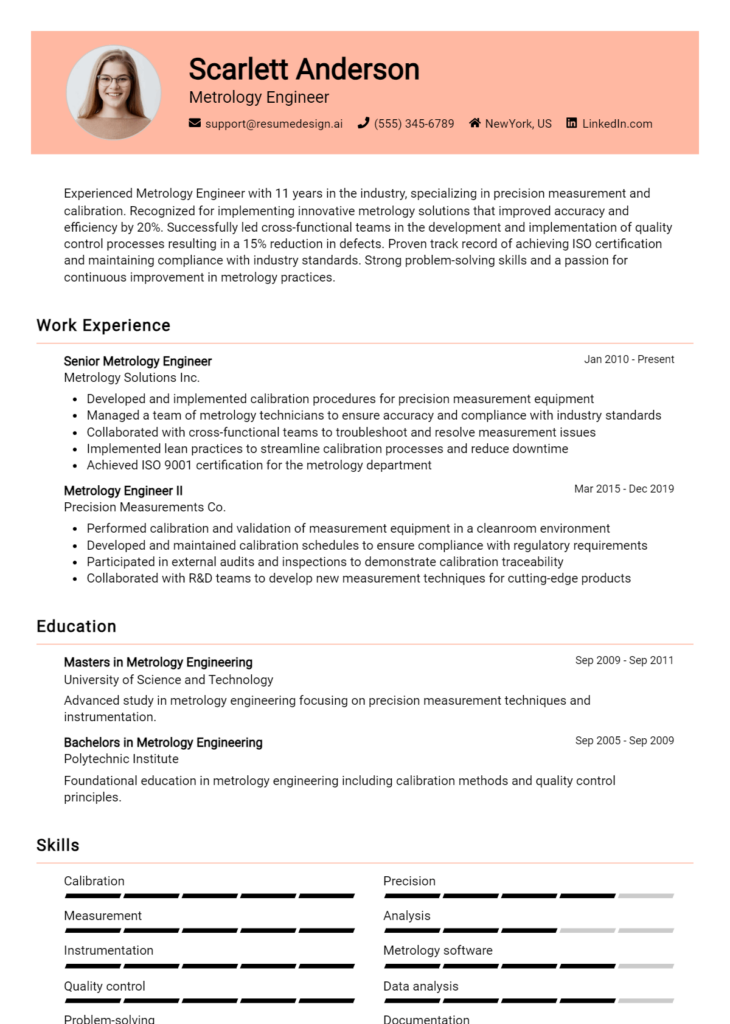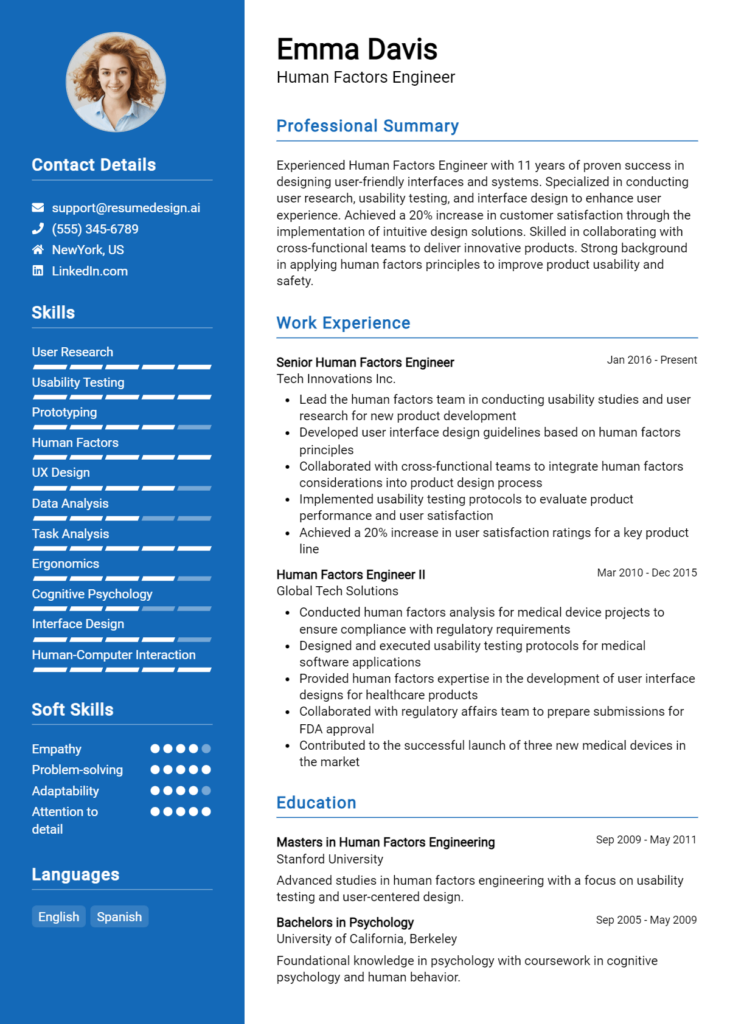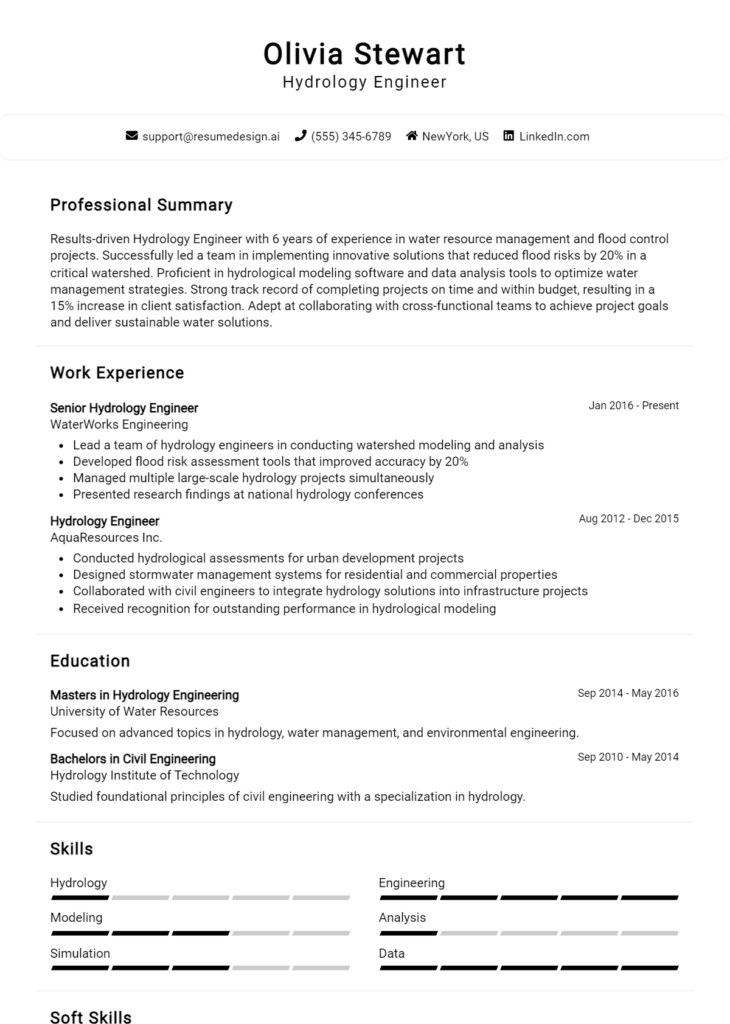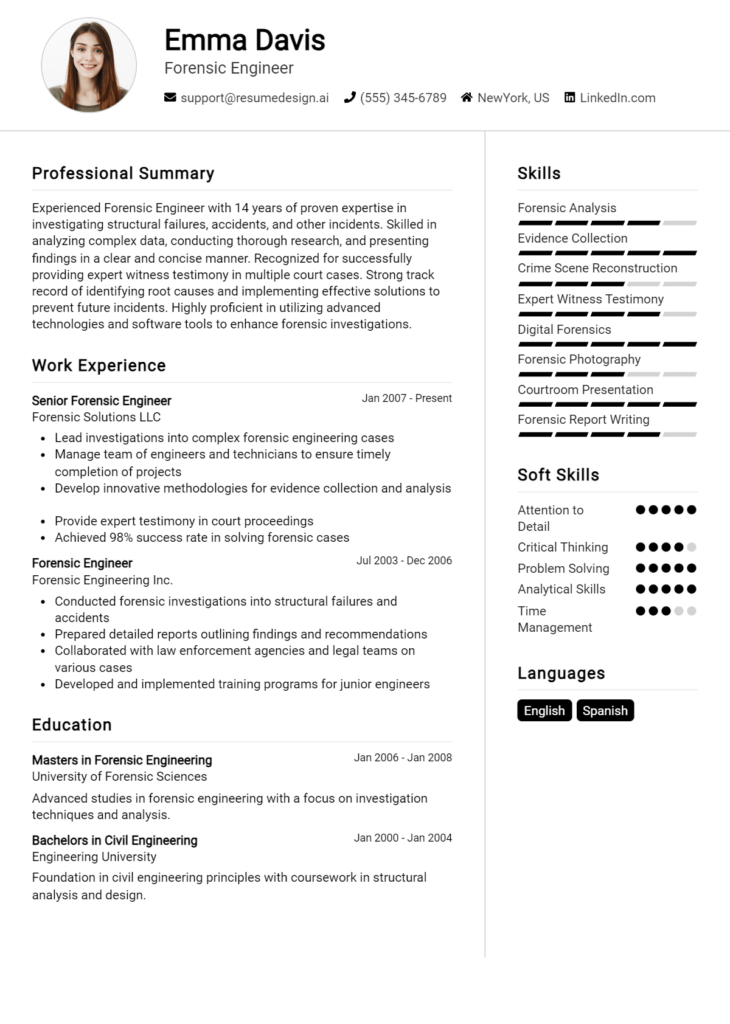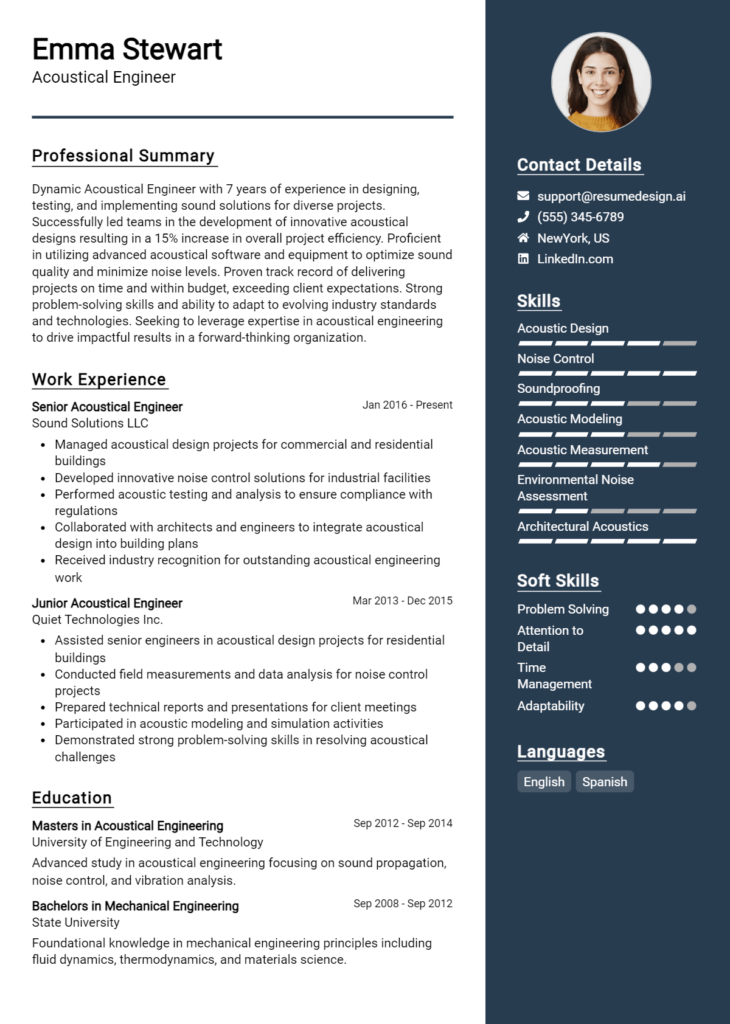Optical Engineer Core Responsibilities
Optical Engineers play a crucial role in designing, testing, and implementing optical systems and components. They must possess strong technical skills in optics and photonics, alongside excellent problem-solving abilities to address complex challenges. This role often bridges departments, requiring collaboration with mechanical and electrical engineers to ensure seamless integration of systems. A well-structured resume highlighting these competencies can effectively demonstrate an Optical Engineer’s value in contributing to organizational goals, enhancing operational efficiency and innovation.
Common Responsibilities Listed on Optical Engineer Resume
- Design and analyze optical systems and components.
- Conduct experiments to test optical devices and materials.
- Collaborate with cross-functional teams on product development.
- Utilize software tools for optical simulation and modeling.
- Develop specifications and documentation for optical systems.
- Perform troubleshooting and problem-solving for optical issues.
- Ensure compliance with industry standards and regulations.
- Manage project timelines and deliverables effectively.
- Participate in the research and development of new technologies.
- Provide technical support and expertise to clients and stakeholders.
High-Level Resume Tips for Optical Engineer Professionals
In the competitive field of optical engineering, a well-crafted resume serves as a crucial gateway to potential job opportunities. It is often the first impression that candidates make on hiring managers, making it imperative that the resume not only presents a polished professional image but also effectively highlights key skills and significant achievements. A strong resume should convey both technical expertise and a track record of success in the optical engineering domain. This guide will provide practical and actionable resume tips specifically tailored for Optical Engineer professionals, enabling candidates to stand out in a crowded job market.
Top Resume Tips for Optical Engineer Professionals
- Tailor your resume to match the job description by incorporating relevant keywords and phrases from the posting.
- Highlight your educational background, including degrees, certifications, and specialized training in optical engineering.
- Showcase your relevant experience by detailing specific projects or roles that align with the job you are applying for.
- Quantify your achievements by using metrics to demonstrate the impact of your work, such as improved efficiency or reduced costs.
- Emphasize your technical skills, including proficiency in optical design software and knowledge of industry standards.
- Include any patents, publications, or presentations that showcase your contributions to the field of optical engineering.
- Utilize a clean and professional format that enhances readability and allows key information to stand out.
- Incorporate soft skills like problem-solving and teamwork, which are essential in collaborative engineering environments.
- Make sure to proofread your resume to eliminate any spelling or grammatical errors that could undermine your professionalism.
- Consider adding a brief summary or objective statement at the top of your resume to provide context about your career goals and expertise.
By implementing these tips, Optical Engineer professionals can significantly increase their chances of landing a job in their field. A resume that effectively showcases tailored skills, relevant experience, and quantifiable achievements can capture the attention of hiring managers and set candidates apart from the competition. With a focused and polished resume, you can take a confident step toward achieving your career aspirations in optical engineering.
Why Resume Headlines & Titles are Important for Optical Engineer
In the competitive field of optical engineering, a well-crafted resume headline or title is crucial for making a strong first impression. The headline serves as a succinct summary of a candidate's qualifications, immediately capturing the attention of hiring managers who sift through numerous applications. A strong headline can effectively highlight key skills, relevant experience, and unique accomplishments in just a few impactful words, setting the tone for the rest of the resume. It should be concise, relevant, and directly aligned with the specific job being applied for, ensuring that the candidate stands out in a crowded applicant pool.
Best Practices for Crafting Resume Headlines for Optical Engineer
- Keep it concise—limit your headline to one or two impactful phrases.
- Make it role-specific by incorporating keywords from the job description.
- Highlight your most relevant skills or certifications, such as "Optical Design Expert" or "Familiar with Optical Simulation Software."
- Use action-oriented language to convey your professional identity, like "Innovative Optical Engineer."
- Focus on your unique selling proposition, showcasing what sets you apart from other candidates.
- Consider including quantifiable achievements, such as "Optical Engineer with 10+ Patents in Lens Design."
- Avoid jargon or overly technical terms that might confuse hiring managers.
- Regularly update your headline to align with evolving career goals and job opportunities.
Example Resume Headlines for Optical Engineer
Strong Resume Headlines
Innovative Optical Engineer Specializing in Advanced Lens Design
Experienced Optical Engineer with Expertise in Optical Testing and Validation
Optical Systems Designer with Proven Track Record in Project Management
Weak Resume Headlines
Optical Engineer Looking for Job
Professional with Experience in Optics
The strong headlines are effective because they clearly communicate the candidate's specialized skills and experiences, making it easy for hiring managers to understand their value at a glance. In contrast, the weak headlines lack specificity and fail to convey any unique qualifications, rendering them forgettable and unengaging. A compelling headline is a vital tool for establishing a positive first impression and piquing interest in the applicant's full resume.
Writing an Exceptional Optical Engineer Resume Summary
Crafting an exceptional resume summary is crucial for Optical Engineers as it serves as the first impression for hiring managers. A strong summary quickly captures attention by succinctly showcasing key skills, relevant experience, and notable accomplishments that align with the job role. This concise introduction not only highlights the candidate's qualifications but also demonstrates their understanding of the specific demands of the position. By effectively tailoring the summary to the job description, candidates can make a memorable impact that encourages further review of their resume.
Best Practices for Writing a Optical Engineer Resume Summary
- Quantify achievements: Use numbers and metrics to illustrate your impact and contributions.
- Focus on relevant skills: Highlight specific technical and soft skills that are pertinent to the Optical Engineer role.
- Tailor for the job description: Customize your summary to reflect the requirements and responsibilities outlined in the job listing.
- Keep it concise: Aim for 2-4 sentences that deliver maximum information in a brief format.
- Use action verbs: Start sentences with strong action verbs to convey confidence and proactivity.
- Include industry keywords: Incorporate relevant jargon and terminology to demonstrate your familiarity with the field.
- Showcase problem-solving abilities: Mention instances where you successfully addressed challenges or improved processes.
- Reflect your career goals: Convey your aspirations and how they align with the potential employer's objectives.
Example Optical Engineer Resume Summaries
Strong Resume Summaries
Detail-oriented Optical Engineer with over 5 years of experience in designing and testing optical systems, resulting in a 30% reduction in production costs through innovative design modifications. Proficient in using Zemax and SolidWorks to create high-performance optical devices.
Results-driven Optical Engineer with a proven track record of leading cross-functional teams in the development of cutting-edge imaging solutions, achieving a 25% increase in product efficiency. Expertise in optical design, metrology, and project management.
Skilled Optical Engineer with extensive knowledge in fiber optics and laser technology, successfully launching three new products that generated over $1 million in revenue within the first year. Adept at collaborating with R&D teams to optimize product designs.
Weak Resume Summaries
Optical Engineer with experience in the field. Looking for a new opportunity to apply my skills.
Dedicated professional with a background in optics. Seeking a position where I can contribute to team success.
The strong resume summaries are effective because they provide specific achievements, quantifiable results, and relevant skills that directly relate to the Optical Engineer role, showcasing the candidates' value to potential employers. In contrast, the weak summaries lack detail and specificity, making them generic and unremarkable, failing to capture the attention of hiring managers.
Work Experience Section for Optical Engineer Resume
The work experience section of an Optical Engineer resume is a critical component that allows candidates to demonstrate their technical skills, leadership abilities, and commitment to delivering high-quality products. This section serves as a platform to showcase how past roles have honed their expertise in optical design, system integration, and project management. By quantifying achievements and aligning their experience with industry standards, candidates can effectively communicate their value to potential employers, setting themselves apart in a competitive job market.
Best Practices for Optical Engineer Work Experience
- Highlight specific technical skills relevant to optical engineering, such as Ray Tracing, Optical Design Software (e.g., Zemax, Code V), and system testing methodologies.
- Quantify achievements by including metrics, such as percentage improvements in efficiency, cost savings, or successful project completions.
- Use action verbs to describe responsibilities and accomplishments, emphasizing leadership roles and contributions to team success.
- Align experience descriptions with industry standards and terminology to demonstrate familiarity with current trends and technologies.
- Include collaborative projects to illustrate teamwork and communication skills, showcasing the ability to work effectively in multidisciplinary teams.
- Focus on results-driven narratives that explain how your contributions directly impacted the organization or project outcomes.
- Tailor the work experience section to match the specific requirements of the job you are applying for, emphasizing relevant experiences.
- Incorporate any certifications or continual education that align with your work experience to enhance credibility.
Example Work Experiences for Optical Engineer
Strong Experiences
- Led a team of 5 engineers in designing an innovative optical system that reduced production costs by 30% while improving image quality, resulting in a successful product launch ahead of schedule.
- Implemented a new testing protocol that increased the accuracy of optical measurements by 25%, significantly enhancing product reliability and customer satisfaction.
- Collaborated with cross-functional teams to integrate optical components into a complex imaging system, completing the project 15% under budget and receiving commendation from senior management.
Weak Experiences
- Worked on various optical projects and helped with design aspects.
- Participated in team meetings and contributed ideas for optical improvements.
- Assisted in testing optical systems and provided feedback.
The examples provided showcase strong experiences through specific, quantifiable achievements and clear evidence of technical leadership and collaboration, making them compelling to potential employers. In contrast, the weak experiences lack detail and measurable outcomes, making it difficult for hiring managers to grasp the candidate's true capabilities and contributions. Strong statements convey impact, while weak statements remain vague and unimpressive, failing to demonstrate the candidate's expertise in the field.
Education and Certifications Section for Optical Engineer Resume
The education and certifications section of an Optical Engineer resume is crucial as it serves as a comprehensive overview of the candidate's academic background and industry qualifications. This section not only showcases the foundational knowledge and technical skills acquired through formal education but also highlights any relevant certifications that demonstrate a commitment to professional development and ongoing learning. By including pertinent coursework, specialized training, and recognized credentials, candidates can significantly enhance their credibility, making them more appealing to potential employers seeking expertise in optical engineering.
Best Practices for Optical Engineer Education and Certifications
- Prioritize relevant degrees such as Optical Engineering, Physics, or Electrical Engineering.
- Include industry-recognized certifications, such as Certified Optical Engineer (COE) or Optical Society of America (OSA) membership.
- Detail any specialized training or workshops related to optical technologies and systems.
- List relevant coursework that aligns with the skills required for optical engineering roles.
- Keep the information concise and focused on qualifications that match the job description.
- Highlight any honors or awards received during academic pursuits that reflect excellence in the field.
- Use clear formatting to enhance readability and ensure easy identification of key qualifications.
- Update the section regularly to reflect the most current and relevant credentials.
Example Education and Certifications for Optical Engineer
Strong Examples
- Master of Science in Optical Engineering, University of California, Berkeley, 2022
- Certified Optical Engineer (COE) by the Optical Society of America, 2023
- Relevant Coursework: Optical Design, Wave Optics, and Photonics Systems
- Completion of Advanced Photonics Workshop, SPIE, 2021
Weak Examples
- Bachelor of Arts in History, State University, 2015
- Certification in Basic Computer Skills, 2019
- Online Course in Photography Techniques, 2020
- High School Diploma, Local High School, 2010
The examples provided are considered strong because they directly relate to the skills and qualifications necessary for an Optical Engineer role, showcasing relevant degrees, certifications, and specialized training that align with industry standards. In contrast, the weak examples reflect educational qualifications and certifications that are irrelevant to the field of optical engineering, lacking the necessary technical focus and updates that would be valuable to potential employers in this specialized area.
Top Skills & Keywords for Optical Engineer Resume
As an Optical Engineer, possessing the right skills is crucial not only for crafting a compelling resume but also for excelling in the field. A well-structured resume that highlights both hard and soft skills can significantly impact your job search, showcasing your qualifications and suitability for potential employers. Optical Engineering is a highly specialized discipline that requires a blend of technical expertise and interpersonal abilities. By emphasizing these skills, you can demonstrate your capability to design, analyze, and implement optical systems effectively while collaborating with multidisciplinary teams. For more information on how to enhance your resume, check out skills and work experience.
Top Hard & Soft Skills for Optical Engineer
Soft Skills
- Problem-solving
- Communication
- Team collaboration
- Attention to detail
- Critical thinking
- Time management
- Adaptability
- Creativity
- Project management
- Analytical skills
Hard Skills
- Optical design software proficiency (e.g., Zemax, Code V)
- Knowledge of optical materials and coatings
- Ray tracing and modeling techniques
- Familiarity with optical fabrication processes
- Experience with metrology and testing methods
- Proficiency in CAD software
- Understanding of light propagation and optics principles
- Experience with lasers and photonics systems
- Knowledge of imaging systems and detectors
- Data analysis and interpretation
By highlighting these essential soft and hard skills in your resume, you can effectively showcase your qualifications and readiness for a successful career as an Optical Engineer.
Stand Out with a Winning Optical Engineer Cover Letter
Dear Hiring Manager,
I am writing to express my interest in the Optical Engineer position at [Company Name], as advertised on [Job Board/Company Website]. With a Master's degree in Optical Engineering and over five years of experience in designing and optimizing optical systems, I am excited about the opportunity to contribute to your innovative projects. My background in both theoretical and practical aspects of optics, combined with my passion for cutting-edge technology, makes me a strong candidate for this role.
Throughout my career, I have successfully led projects involving lens design, optical simulation, and system integration for a variety of applications, including telecommunications and imaging systems. At [Previous Company Name], I was instrumental in developing a high-performance optical system that improved image clarity by 25% while reducing production costs. My proficiency in software tools such as Zemax and MATLAB, along with my ability to collaborate effectively with cross-functional teams, ensures that I can deliver high-quality results within tight deadlines.
I am particularly drawn to [Company Name] because of your commitment to advancing optical technology and your focus on sustainable solutions. I admire your recent initiatives in [specific project or technology relevant to the company], and I am eager to bring my expertise in optical design and analysis to your team. I am confident that my skills and experiences align well with your needs, and I look forward to the possibility of contributing to your ongoing success.
Thank you for considering my application. I am eager to discuss how my background, skills, and enthusiasms align with the goals of [Company Name]. I am looking forward to the opportunity for an interview to further explore how I can contribute to your team.
Sincerely,
[Your Name]
[Your Contact Information]
[Your LinkedIn Profile or Portfolio, if applicable]
Common Mistakes to Avoid in a Optical Engineer Resume
When crafting a resume for an Optical Engineer position, it's essential to present your qualifications and experiences effectively. However, many candidates make common mistakes that can hinder their chances of landing an interview. Understanding these pitfalls can help you create a more compelling resume that highlights your expertise in optics and engineering. Here are some frequent errors to avoid:
Generic Objective Statement: Using a vague objective statement that doesn't relate to the optical engineering field can make your resume less impactful. Tailor your objective to reflect your specific goals and how they align with the company's needs.
Lack of Relevant Keywords: Failing to include industry-specific keywords can result in your resume being overlooked by applicant tracking systems (ATS). Be sure to incorporate terms and phrases commonly found in the job description.
Overloading with Technical Jargon: While it's important to showcase your technical skills, using excessive jargon can confuse hiring managers. Aim for a balance between technical language and clear explanations that demonstrate your expertise.
Ignoring Quantifiable Achievements: Simply listing job duties without quantifying your achievements can make your contributions seem less significant. Use metrics and specific examples to illustrate your impact, such as "improved optical system efficiency by 20%."
Inconsistent Formatting: A disorganized or inconsistent format can distract from the content of your resume. Ensure that your layout, font, and style are uniform throughout the document for a professional appearance.
Neglecting Soft Skills: Optical engineering isn't just about technical knowledge; soft skills like teamwork, communication, and problem-solving are equally important. Highlight these skills to show your ability to collaborate and contribute effectively in a team environment.
Too Much Focus on Education: While education is important, especially for entry-level positions, overemphasizing it at the expense of work experience can be detrimental. Focus on relevant projects, internships, and job roles that showcase practical application of your skills.
Omitting Professional Development: Failing to mention any continued education, certifications, or relevant workshops can make you appear stagnant in your career. Include any ongoing learning opportunities that demonstrate your commitment to staying current in the field.
Conclusion
As an Optical Engineer, you play a crucial role in the design and development of optical systems and devices. Your expertise in areas such as lens design, optical testing, and imaging technology is essential for creating innovative solutions across various industries, from telecommunications to healthcare. In this article, we explored the key skills and qualifications necessary for success in this field, including proficiency in optical software, an understanding of wave optics, and the ability to collaborate with multidisciplinary teams.
To ensure you stand out in this competitive job market, it's vital to present a polished and professional resume that highlights your unique qualifications and experiences. We encourage you to take a moment to review your Optical Engineer resume and make any necessary updates.
To assist you, we recommend utilizing resources such as resume templates, which can help you structure your information effectively. Additionally, our resume builder offers an easy way to create a tailored resume that showcases your skills and achievements. For inspiration, check out our resume examples that are specifically designed for Optical Engineers. Don't forget to complement your resume with a strong application by using our cover letter templates.
Take action today and ensure your resume reflects your capabilities as an Optical Engineer!

